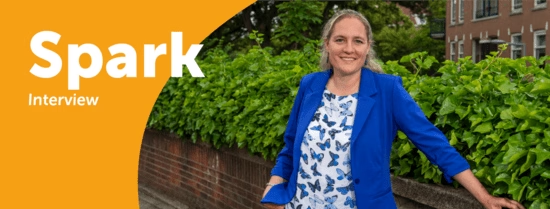How do you offer good support to children and young people growing up in difficult circumstances? How do you offer them opportunities? Child and youth care is a real priority for Professor Annemiek Harder. As endowed professor, she researches what works and does not work in practice. And although youth care in the Netherlands is under pressure, Annemiek is seeing some encouraging developments, particularly when social workers use Motivational Interviewing and are given the space to improve their skills in this.
Annemiek obtained a degree in psychology from the University of Groningen. She used to work with clients who ended up on the wrong track. “As practitioner, I wanted to work with people who were given a raw deal. What happens when you end up on the wrong track? What plays a role in this? And what is needed to bring about a change? I’ve seen extreme cases and harrowing situations,” explained Annemiek.
Horizon chair
In the end, she also started working in that field, as a researcher rather than a practitioner. Annemiek is a Horizon chair endowed professor for evidence-based youth care and education. “In our research, we work closely with practitioners. We conduct research that really makes a difference and that has societal impact. Our goal is to help improve practice. We investigate what works in practice and combine knowledge on this for practitioners to use in practice.”
Motivational interviewing
Annemiek has extremely positive experiences with a treatment method known as Motivational Interviewing; a treatment method used, for instance, with people who have addiction issues. In Annemiek’s opinion, the basic approach of this treatment method makes it appropriate for use in youth care and education. “Motivational Interviewing requires practitioners to be non-judgemental. That sounds easier than it is. Because which question is without judgement? As practitioner, how do you respond with sensitivity? And do you also check that you heard things correctly?
A question about your spark
Motivational Interviewing helps clients to think for themselves. Annemiek continued: “You can say to a client: ‘Maybe you’d be better not smoke too much and spend less so you don’t end up in the red.’ But the question is whether the client will change his or her behaviour based on your well-intentioned advice. I’ve seen fantastic examples in practice of a practitioner asking clients about their motivations in life. ‘What is important in your life?’ is a question that makes people start thinking for themselves. It’s about your motivation, your spark.” In Annemiek’s opinion, there should be a bigger focus on this in youth care. “Motivational Interviewing often already has a place in training in the Netherlands, but I want to ensure that practitioners have the time and space after their studies to become more skilled in this.”
Aiming for quality
Annemiek shares the frustration currently often experienced by both youth care clients and practitioners. “In the Netherlands we need to understand the importance of good child and youth care,” she stated. “And the government can solve that by investing money in the right things. It’s important here that we value our care professionals. Practitioners are idealists. All they want is to help parents and children, and they do that with a unique instrument: themselves. This demands support and the right conditions so that they can do their work well. So it’s important that they receive good supervision and have the space for further professionalisation. Aiming for quality and not only focusing on administration and financing is crucial if we are to offer good youth care.”
About Horizon and Stichting Gereformeerd Burgerweeshuis
The Horizon chair is financed by the Rotterdam Stichting Gereformeerd Burgerweeshuis (GBW). GBW aims to improve the upbringing and education of minors and supports the work of youth care and education institutions. Horizon is a national provider of specialist youth care and education to children with complex problems. Within the iHUB cooperative arrangement, Horizon works closely with De Opvoedpoli, Altra and De Nieuwe Kans to design a different and improved youth care, mental health and education system for children, young people and their parents. Horizon is supported by GBW in projects that cannot be realised via standard funding sources.
- Researcher
- More information
This interview previously appeared in Spark magazine. This magazine is for students, alumni and partners of ESSB and showcases the positive impact that the faculty's education and research have on society.
- Related content

